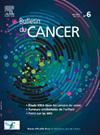Enjeux éthiques du suivi à long terme des cancers pédiatriques
IF 0.8
4区 医学
Q4 ONCOLOGY
引用次数: 0
Abstract
Introduction
L’avancée des connaissances sur les risques de complications et séquelles appelle la mise en place d’un suivi à long terme après la fin des traitements de cancers pédiatriques. Se pose alors la question des enjeux éthiques liés à l’information des anciens patients et aux sollicitations médicales visant à leur proposer une consultation de suivi à long terme.
Méthode
Nous avons mené une étude qualitative en deux volets : (1) Une enquête par entretiens semi-directifs visant à explorer le vécu des anciens patients à l’égard des sollicitations médicales de suivi ; (2) La constitution d’un groupe de réflexion éthique pluridisciplinaire visant à faire émerger les enjeux éthiques liés à la systématisation du suivi.
Résultats
L’étude a fait émerger cinq enjeux liés aux sollicitations médicales et à la mise en place du suivi : (1) Les besoins et les attentes des anciens patients en termes d’information ; (2) La temporalité de l’après-cancer ; (3) L’ambivalence des catégorisations au regard de la pluralité du vécu de l’après-cancer ; (4) Le rôle des différents professionnels et la responsabilité du suivi ; (5) La pluralité des besoins et propositions.
Discussion
Au regard de ces enjeux, cinq points de vigilance émergent : (1) Informer sur un risque dans une vie après la maladie ; (2) Quand proposer un suivi après cancer ? (3) Les « anciens patients », une catégorie en question ? (4) Qui peut/doit endosser le rôle et la responsabilité du suivi ? (5) La pluralité du suivi : entre homogénéisation et appui sur réseaux informels.
Introduction
Advances in knowledge about late effects of childhood cancer treatments have led to implement long-term follow-up care. This raises the question of the ethical issues involved in providing information to survivors, and in proposals for long-term follow-up consultations.
Method
We conducted a two-part qualitative study: (1) A semi-directive interview survey to explore survivors’ experiences of medical proposals for follow-up consultations; (2) The creation of a multidisciplinary ethical reflection group aimed at identifying the ethical issues associated with the systematization of follow-up care.
Results
The study identified five key issues related to medical requests and the implementation of follow-up care: (1) The needs and expectations of former patients regarding information; (2) The temporality of after-cancer; (3) The ambivalence of categorizations in light of the diversity of post-cancer experiences; (4) The role of various professionals and the responsibility for follow-up; (5) The plurality of needs and proposed approaches.
Discussion
In light of these issues, five areas of concern emerge: (1) Provide information about a risk in life after the disease? (2) When should follow-up be proposed? (3) The category of “former patients”: relevant or problematic? (4) Who can or should assume the role and responsibility for follow-up? (5) The diversity of follow-up approaches: balancing standardization with reliance on informal networks.
[儿科癌症长期随访的伦理问题]。
导读:儿童癌症治疗的晚期效应知识的进步导致实施长期随访护理。这就提出了向幸存者提供信息和长期后续磋商建议所涉及的伦理问题。方法:采用两部分质性研究:(1)采用半指导性访谈法,探讨幸存者对医疗建议的体验,以供后续会诊;(2)建立一个多学科伦理反思小组,旨在确定与后续护理系统化有关的伦理问题。结果:研究确定了与医疗请求和后续护理实施相关的五个关键问题:(1)前患者对信息的需求和期望;(2)术后时间过长;(3)根据癌症后经历的多样性,分类的矛盾;(4)各专业人员的作用和跟进责任;(5)需求和建议方法的多元性。讨论:鉴于这些问题,出现了五个值得关注的领域:(1)提供有关疾病后生活风险的信息?(2)何时提出跟进?(3)“前患者”类别:相关还是有问题?(4)谁可以或应该承担后续的角色和责任?(5)后续措施的多样性:平衡标准化与依赖非正式网络。
本文章由计算机程序翻译,如有差异,请以英文原文为准。
求助全文
约1分钟内获得全文
求助全文
来源期刊

Bulletin Du Cancer
医学-肿瘤学
CiteScore
1.90
自引率
16.70%
发文量
224
审稿时长
37 days
期刊介绍:
Without doubt, the ''Bulletin du Cancer'' is the French language publication of reference in the field of cancerology. Official organ of the French Society of Cancer, this journal covers all the information available, whether in the form of original articles or review articles, but also clinical cases and letters to the editor, including various disciplines as onco-hematology, solids tumors, medical oncology, pharmacology, epidemiology, biology as well as fundamental research in cancerology. The journal proposes a clinical and therapeutic approach of high scientific standard and regular updates in knowledge are thus made possible. Articles can be submitted in French or English.
 求助内容:
求助内容: 应助结果提醒方式:
应助结果提醒方式:


